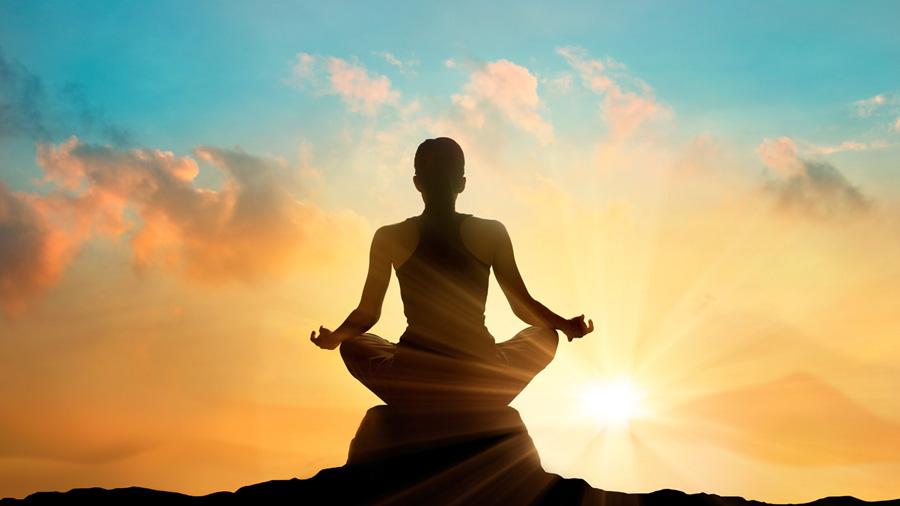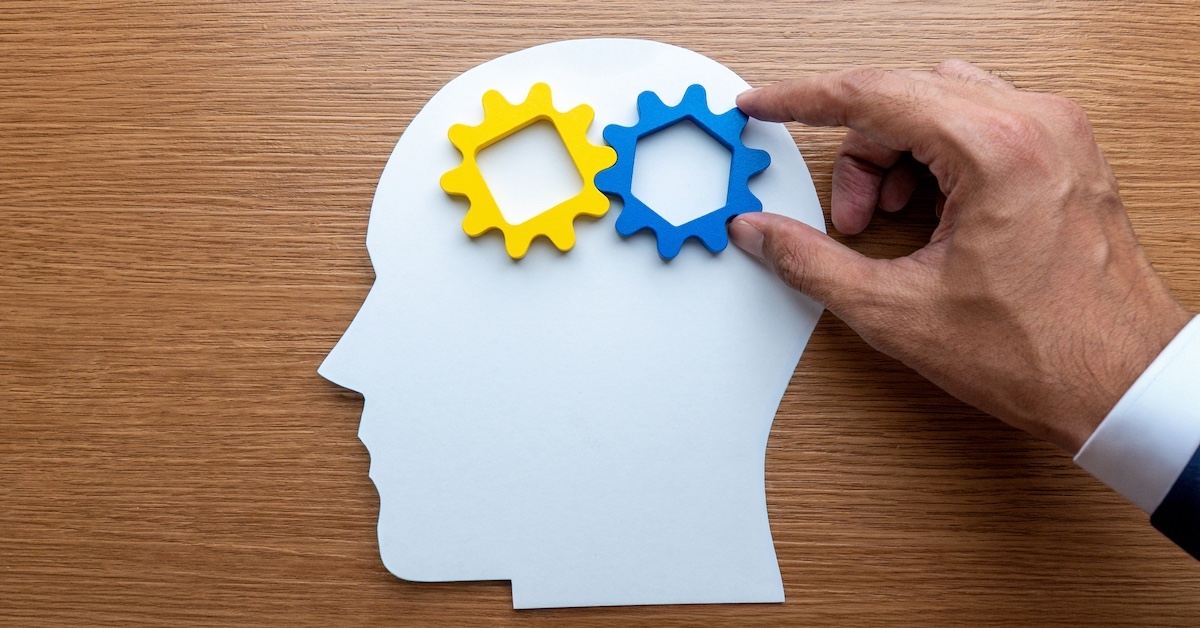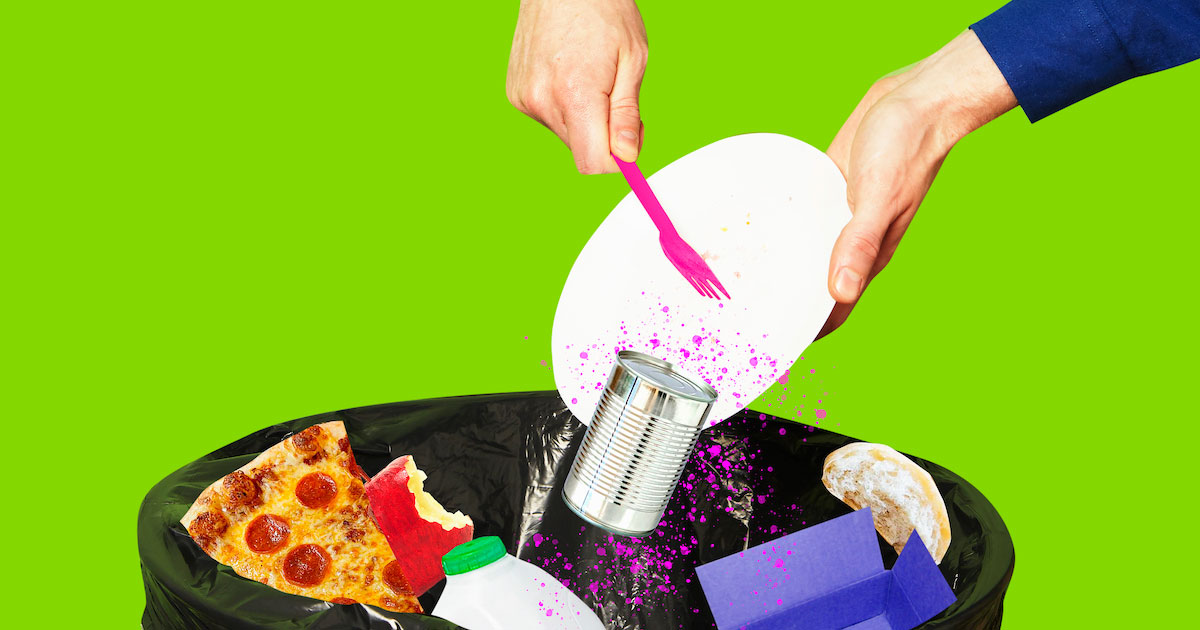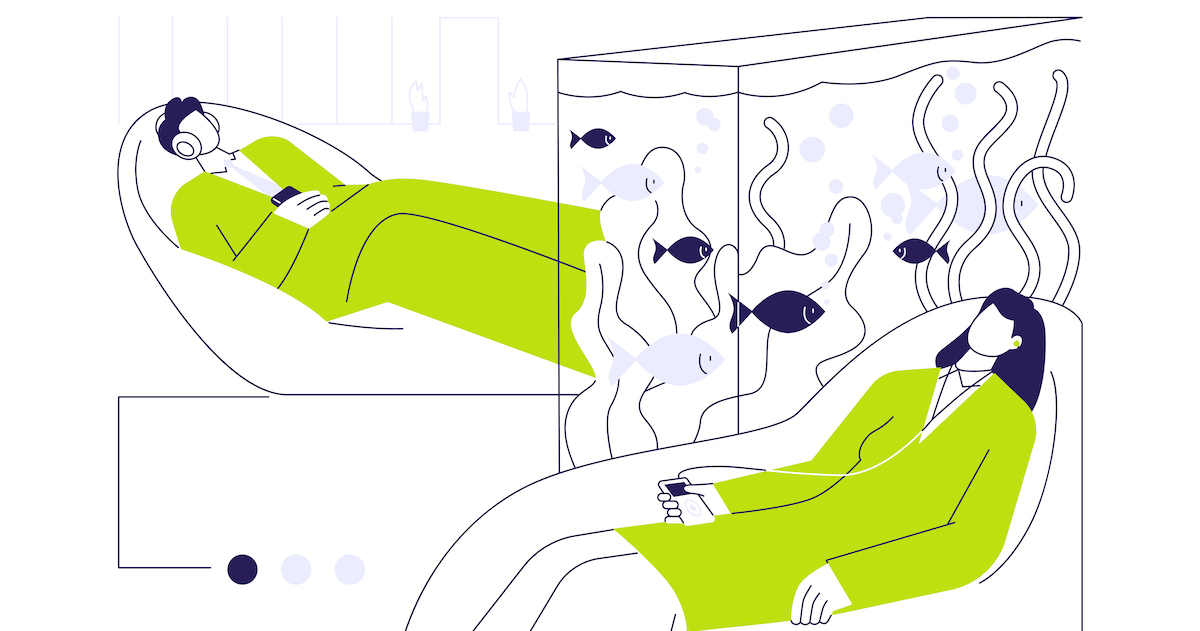Biet Simkin can bring someone into a conscious state in 11 minutes.
“It’s a matter of being. It’s as simple as this: If you are at a dinner and Ella Fitzgerald happens to be there and sings a six-minute jazz standard, that will forever be a very different dinner,” she says. “I am what Ella is to that dinner to hotel guests having a moment with me and my work.”
Simkin is the founder of the Center of the Cyclone and in January was named the in-house meditation leader at New York’s 1 Hotels. Her style helps those often in a hurry who don’t have time to meditate for an hour.
As an artist, and someone who doesn’t have every hand in the spiritual world, I create a space that is easy to hop into for everyday people,” she says. “I don’t ask that you give up your desires to work with me or to pursue your own joy. I tell it straight, I curse, I share flaws openly and I incorporate art and music into the experiences I present. I do this all because my inspiration doesn’t only hail from spiritual texts and practices, but also the firm belief that falling in love, watching a perfect film, hearing a perfect song and losing someone you love to death are all spiritual experiences as well, and I help people to remember that they can live regular lives and still become enlightened. I teach them how that is done. I share with them the state that has helped me to remember who I truly am, and thereby, my guests have that same experience.
The Wellness Industry
The Global Wellness Institute (GWI) defines wellness as “a state of complete physical, mental and social well-being,” and the industry has become a US$3.7 trillion market, according to the organization’s 2016 Global Wellness Economy Monitor. The industry grew 10.6 percent from 2013-2015, with world travelers making 691 million wellness trips in 2015. And the hospitality industry has taken notice by providing an increase in a wealth of wellness offerings.
It’s not just spas and massages, though, that travelers are interested in. They want relief for their minds, too, and the GWI predicts mental wellness programming at hotels and resorts as the No. 1 trend for the industry in the coming years.
Wellness has traditionally focused on the body more than the mind, but the GWI predicts that mindfulness meditation will become more mainstream in 2017. There are already more than 1,300 apps for mindfulness meditation, for instance, according to mobile apps analytical firm Sensor Tower. The most popular one is Headspace, which has 11 million downloads.
Simkin is wary of people turning toward machines to help them be more mindful.
“Now that we are being attached to machines and more, from ATMs to the Apple Watch, it will be ever vital that we remember that we are not machines” she says. “We are real. It will become ever more important to do this work so we can separate from the world of machines and dip into our essence.”
A Level of Being
Simkin has created mediation events for several large companies and organizations, such as Adidas, Lululemon, Soul Cycle, Sundance Film Festival, Vice and the Wanderlust Festival. But she wasn’t always spiritual.
“Although I studied with my father—a well-known Russian doctor and spiritual teacher—since I was in diapers, I wasn’t able to commit to a spiritual path until later in life,” she says says. “I am grateful that part of my spiritual teaching comes from the detour I took when I got signed to Sony at 18 and took a decade to do rock and roll.”
Simkin says she became sober and chose to try something new eight years ago.
“I returned to my father’s teachings and began to practice and share them on a daily basis,” she says. “My whole life changed because it became a life based on giving, rather than receiving. Since that moment’s decision, I have found true love, feel joyful every day, found best friends who share in my delight of being at their highest excellence, found peace of mind, ease from any stress or worry, simple solutions to things I used to think were big problems, a career of my dreams and so much more.”
Simkin says there’s a line easily drawn from her meditation practice to all the good things in her life.
“As I grow with my practice, the only thing that changes is my level of being,” she says says. “I must always remember that keeping my spiritual practice first keeps the grass green in all other areas of my life. So, if ever I am tired or feeling bluesy, I know that my effort needs to be doubled.”
Mindfulness and Stress
Mindfulness is about being in the moment. It is “the basic human ability to be fully present, aware of where we are and what we’re doing and not overly reactive or overwhelmed by what’s going on around us,” according to Mindful.org, a non-profit organization that promotes mindfulness and compassion in life.
However, what is going on around us often does overwhelm and create stress in our lives. In fact, the average reported stress level for U.S. citizens between August 2016 and January 2017 rose from 4.8 to 5.1 (on a one to 10 scale, with 10 equating high stress), per the American Psychological Association’s (APA) report Stress in America: Coping with Change released in February.
The report shows the percentage of people claiming at least one health symptom because of stress rose from 71 percent to 80 percent over a five-month period. Study participants reported specific stress symptoms such as headaches, feeling overwhelmed, feeling nervous or anxious and feeling depressed or sad.
“While these common health symptoms might seem minor, they can lead to negative effects on daily life and overall physical health when they continue over a long period,” Katherine C. Nordal, PhD, APA’s executive director for professional practice, said in a statement.
Scientific studies have shown that mindfulness meditation can help alleviate stress and the ailments that come along with it—up to a point. For example, researchers at Johns Hopkins University analyzed 18,753 mediation studies and found 47 examples that met their inclusion criteria.
“Our review indicates that meditation programs can reduce the negative dimensions of psychological stress,” the researchers wrote in the study. “Mindfulness meditation programs, in particular, show small improvements in anxiety, depression and pain with moderate evidence and small improvements in stress/distress and the mental health component of health-related quality of life with low evidence when compared with nonspecific active controls.”
Training one’s mind to be more aware and in a nonjudgmental state is a daunting activity, the researchers suggest. Still, it’s a skill that can be learned and become easier with practice, especially if guided by a meditation expert.
“All forms of meditation, including mindfulness and mantra, imply that more time spent meditating will yield larger effects,” the researchers wrote. “Most forms, but not all, present meditation as a skill that requires expert instruction and time dedicated to practice. Thus, more training with an expert and practice in daily life should lead to greater competency in the skill or practice, and greater competency or practice would presumably lead to better outcomes.”
Best-kept Secret
Simkin says she helps participants who can only attend one or two of her sessions reach a state that will never be forgotten.
“In each man and woman is a magnet to that sweet state,” she says. “For some people, that magnet is stronger and they will yearn to return to it. Those people must seek and form habits if they choose to return. However, simply bringing people to the state creates an opportunity to nurture that innocent yearning that wants to mature and grow into a mastery of everyday practice.”
Conclusion
Mindfulness meditation is a centuries-long practice that anyone can do. It’s not that, as Simkin says, “you must believe in a God that has a beard, that it is hard, that it’s hippie dippie, that it’s only for women, that it doesn’t actually work,” which are some common misconceptions.
“The main point is the secret that you can be a flawed, humorous, broken, confused, amazing, rich, poor, mean, nice, etc. person,” she says. “You can be anything and anyone and a meditation practice will simply make things better. Period. That’s been a best-kept secret for centuries.”







